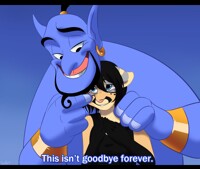Views: 1646
Submissions: 59
Favs: 223

Art Whore | Registered: September 22, 2009 04:03:48 PM
Not Available...
Featured Submission
Stats
Comments Earned: 72
Comments Made: 94
Journals: 4
Comments Made: 94
Journals: 4
Recent Journal
Violence and Vidjagames
12 years ago
Here’s a protip for the therapists of the world: when a college-aged male starts telling you about a traumatic event, and the resulting surges of irrational anger, let them talk. Even if it’s terrible. Even if it’s the worst thing you’ve ever heard. They are talking to you because they also recognize that the stuff pouring out of their mouth is the kind of bile no healthy person could even conceive. Recognize the impulses of ultraviolence as what they are: symptoms of the traumatic event.
Do not suggest that they are symptoms of “too many videogames.”
I’m used to hearing this ridiculous idea from conservative radio, Fox News, indeed any pundit over the age of forty, traditionally rich fat white men or their shrieking cow-eyed blonde eye candy. I do not expect to hear it from anyone for whom I have even a modicum of respect. Bottom line, if you honestly believe that movies, comic books, and videogames can incite a person to violence, we have nothing to talk about.
Let me tell you what I’ve done lately in videogames…
I’ve been playing a lot of one popular team-based shooter. Just recently in my game, a main character was killed. Shot in the back by the game’s main antagonist. After arriving back at our main base, I received my next mission: inform our friends and compatriots of the character’s death. Individually. I sought each of them out, informed them of the death, and listened as they shared a snippet of how they knew the character. I shared in their grief.
Later on in this same game, players can partake in a semi-comical fantasy world, narrated by a foul-mouthed hyperactive thirteen-year-old. While this section of the game begins as an exercise in whimsy, it soon becomes heart-wrenchingly obvious that the entire narrative is actually a cover, a way for the child to work through her grief regarding our lost comrade.
Or let’s look at one of my favorite games of all time: Fallout 3. The player takes the role of The Lone Wanderer, a punk kid tossed out of the comforts of home into an unforgiving wasteland in search of their missing father. As a role-playing-game, much of the experience is influenced and changed by the player’s own decisions. However, one key event that does not change is that the Lone Wanderer does, eventually, find their dad, and even has an opportunity to work alongside him, building a way to save the world, as impossible as it may seem.
However, another unavoidable event is the father’s sudden death, sacrificing himself to save the player. This character whom you’ve only seen in snippets, this wise and understanding voice, is abruptly silenced, leaving only emptiness in its wake.
Losses like these hurt me, every time. Whenever the Wanderer’s dad falls to the ground, I’m lost again. Whenever a hyperactive child hugs a digital monument for a fictional character, my heart still breaks. These are little hurts, based on nothing more than my experiences in worlds that do not exist.
These are hurts I can handle, heartaches that do not threaten to overwhelm and consume me.
These are the thoughts that ran through my head this week when a woman had the audacity to tell me my violent impulses are the direct result of videogames. As though I do not recognize where reality ends and digital fantasy begins. How does one even respond to this epic gap in logic?
And so, to future therapists: don’t even suggest it. I play videogames. Sometimes I even play violent videogames. But I do not play videogames for the violence. I play videogames because I know how to handle that small, playful pain, borne of a fictional story.
I do not know how to handle what happened to me.
Do not suggest that they are symptoms of “too many videogames.”
I’m used to hearing this ridiculous idea from conservative radio, Fox News, indeed any pundit over the age of forty, traditionally rich fat white men or their shrieking cow-eyed blonde eye candy. I do not expect to hear it from anyone for whom I have even a modicum of respect. Bottom line, if you honestly believe that movies, comic books, and videogames can incite a person to violence, we have nothing to talk about.
Let me tell you what I’ve done lately in videogames…
I’ve been playing a lot of one popular team-based shooter. Just recently in my game, a main character was killed. Shot in the back by the game’s main antagonist. After arriving back at our main base, I received my next mission: inform our friends and compatriots of the character’s death. Individually. I sought each of them out, informed them of the death, and listened as they shared a snippet of how they knew the character. I shared in their grief.
Later on in this same game, players can partake in a semi-comical fantasy world, narrated by a foul-mouthed hyperactive thirteen-year-old. While this section of the game begins as an exercise in whimsy, it soon becomes heart-wrenchingly obvious that the entire narrative is actually a cover, a way for the child to work through her grief regarding our lost comrade.
Or let’s look at one of my favorite games of all time: Fallout 3. The player takes the role of The Lone Wanderer, a punk kid tossed out of the comforts of home into an unforgiving wasteland in search of their missing father. As a role-playing-game, much of the experience is influenced and changed by the player’s own decisions. However, one key event that does not change is that the Lone Wanderer does, eventually, find their dad, and even has an opportunity to work alongside him, building a way to save the world, as impossible as it may seem.
However, another unavoidable event is the father’s sudden death, sacrificing himself to save the player. This character whom you’ve only seen in snippets, this wise and understanding voice, is abruptly silenced, leaving only emptiness in its wake.
Losses like these hurt me, every time. Whenever the Wanderer’s dad falls to the ground, I’m lost again. Whenever a hyperactive child hugs a digital monument for a fictional character, my heart still breaks. These are little hurts, based on nothing more than my experiences in worlds that do not exist.
These are hurts I can handle, heartaches that do not threaten to overwhelm and consume me.
These are the thoughts that ran through my head this week when a woman had the audacity to tell me my violent impulses are the direct result of videogames. As though I do not recognize where reality ends and digital fantasy begins. How does one even respond to this epic gap in logic?
And so, to future therapists: don’t even suggest it. I play videogames. Sometimes I even play violent videogames. But I do not play videogames for the violence. I play videogames because I know how to handle that small, playful pain, borne of a fictional story.
I do not know how to handle what happened to me.
User Profile
Accepting Trades
No Accepting Commissions
No Character Species
Rat
Favorite Music
Metal
Favorite Games
Fallout: New Vegas
Favorite Gaming Platforms
PC
Favorite Foods & Drinks
Thai

 FA+
FA+




















































